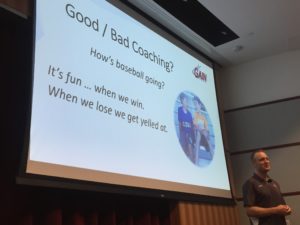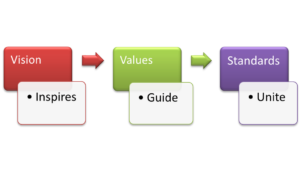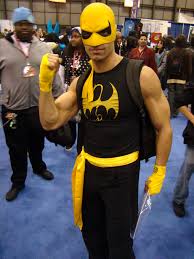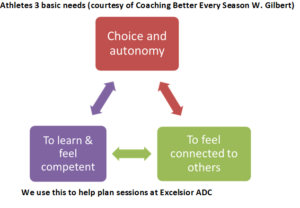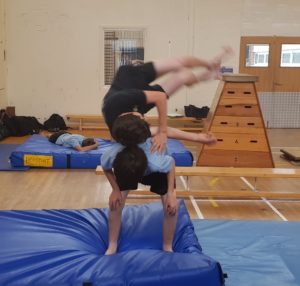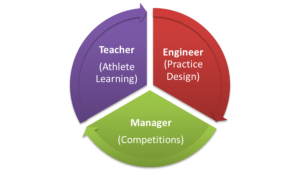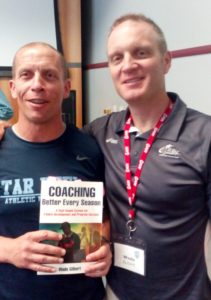Coaching Better Every Season: Wade Gilbert
“If I want to get better, I need to know what better is.”
Wade Gilbert gave an excellent overview of the coaching process and becoming a better coach at his GAIN seminar.
This also served as an overview of his excellent book of the same name.
His talk was split into 4 parts:
- Envision: Pre-season
- Enact: In-Season
- Examine: End of Season
- Enhance: Off Season
He gave practical examples of what has worked from great coaches, and quoted liberally from many books. A good coach is “a teacher with a high energy level.” Said Tony Dungy in “Uncommon”.
Envision: Preaseason
This is the time to set out where you intend to go in the upcoming season. Having a vision of where you want to be is essential to have a successful season.
A good coach will have a vision and be able to outline core values and corresponding behaviour standards for themselves and the team.
Standards ≠ Rules
Wade said it was better to look at the best principles that underpin successful teams and organisations rather than best practices.
Principles endure and can transfer to your team, practices are more likely to be environment, people and context specific.
“Accountability doesn’t require an Iron Fist, just a mutual understanding of what’s being asked and what’s at stake.”
Having behaviour standards for how you start training and competition help you become successful This can often include rituals at practices and competitions and serve as value reminders.
A great coach will be a visionary: “you have to be able to see round corners, see what athletes could become and see things that aren’t there yet.” It is important to outline this vision and bring people with you.
Enact: In- Season
“Never mistake activity for achievement”
Said John Wooden. It is common to be busy in season but becoming a better coach and team is hard.
Wade emphasised the importance of athlete learning and motivation in getting the team to perform better. Prior knowledge can help or hinder the learning process, whilst motivation directly influences learning.
Coaches who use guided discovery and give immediate feedback can help their athletes learn more effectively.
Athletes will be motivated to learn more when they are within a “sweet spot” between challenge and accomplishment. Too easy and they get bored, too hard and they get frustrated. “Stretch learning” is where the athlete can almost touch the end “with support”.
This is something I have tried to incorporate within all our club sessions, balancing the need for a sense of accomplishment and “getting tired” with a sense of challenge and slight frustration at not being there yet.
For example, we might be working on handspring preparations which require shoulder mobility and the ability to “pop”. The drills are easy and can be done by everyone whereas the whole skill is technically difficult and be done by a few.
I then follow this with a simpler skill such as through vault, so the gymnasts can then unleash themselves and get rid of any residual frustration.
The challenge of the activity may have a “High perceived risk, but low actual risk.”
How you give feedback also affects learning. Wade used a push versus pull analogy.
Push (solving problems for someone else) ↔ Pull (helping someone solve their own problem).
Both methods have merit, but that could be situational dependent and as athletes develop, pulling is more beneficial.
Quality practice design
As this is where most of the interaction between coach and athlete usually occurs, it merits more detailed attention.
Wade talked about “Practice efficiency” which he defined as “Do less better”. He outlined the following features of quality practices:
- Purpose
- Variety
- Competition
- Game Speed
Have you evaluated your practice design recently?
Wade then moved onto competition coaching. He quoted research that looked at successful competition coaches who spent time “listening to the match” and had “complex problem solving competences.”
They could react to the live situation effectively and adapt.
Encouragement is often undervalued. Genuine praise for quality performance leads to athletes performing better and having greater enjoyment. Athletes in these environments raised their effort levels and rated their coaches as more effective.
The coach then needs to wear three different hats and have 3 different skill sets to be effective.
Whilst most coaches will be good at one of these, it is rarer to find people comfortable with all three.
Examine: End of Season
“It’s like having a bazooka to kill a mosquito”
Having evaluation tools available to use doesn’t mean we have to use them.
(I would question how many coaches do a formal end of season evaluation: many justifiably run for the hills or slump into a heap exhausted. Some may have a chat in the bar at the end, and then gear up for more of the same next year).
Wade gave some good advice on how to evaluate your own coaching using a “strengths based approach.” (His book has got some great checklists in there). Here are a couple of questions to ask yourself:
- What are my coaching strengths?
- What was your best day of coaching this past year?
- Why was this the best day?
This can form the first of three parts of your end of season evaluation.
- Coaches: magnify their strengths.
- Programme: analyse the practice design and preparation
- Athletes: reinforce values.
I like this because it is achievable for coaches who actually coach, rather than academics pontificating from their Ivory Towers!
Enhance: Offseason
“Charge your battery before you charge someone else’s”
Coaching is hard work. Dan John described feeling at the end of the week as if he had “been pecked to death by a thousand crows”. I describe it as “starting the session like a grape and finishing like a raisin”: there’s not much left in the tank!
At the end of an emotionally, intellectually and somewhat physically demanding season, coaches need to spend time enhancing themselves.
Wade talked about “starting the day on offence”: get up and look after yourself before the demands of others are placed upon you (I adjusted my morning routine 2 years ago).
The offseason should be partly spent on wellness (refreshing) and then setting up new routines that are sustainable in the long term to allow you to reload.
Part of this time is to spend time with people who will help you achieve your goals.Wade quoted from Pep Guardiola’s book about changing the culture of your team.
“Focus on the believers” and do more with them. They will help spread the infection of your culture like a virus.
This was a great thought to finish on. Wade’s talk had lots of practical advice in it that can be implemented immediately, as well as some longer term philosophical ideas that can be reflected upon.
I have previously written about “effective preseason planning” for the nuts and bolts of training. This seminar was more about the coaching effectiveness and I have written a plan to implement over the next few months.
Further Reading:
- Thoughts on early specialisation Vern Gambetta, Randy Ballard, Greg Thompson.
- Next Up: Jim Radcliffe on the robust athlete.
- Coaches start now on our 1 day course “Coaching Athletic Development”

